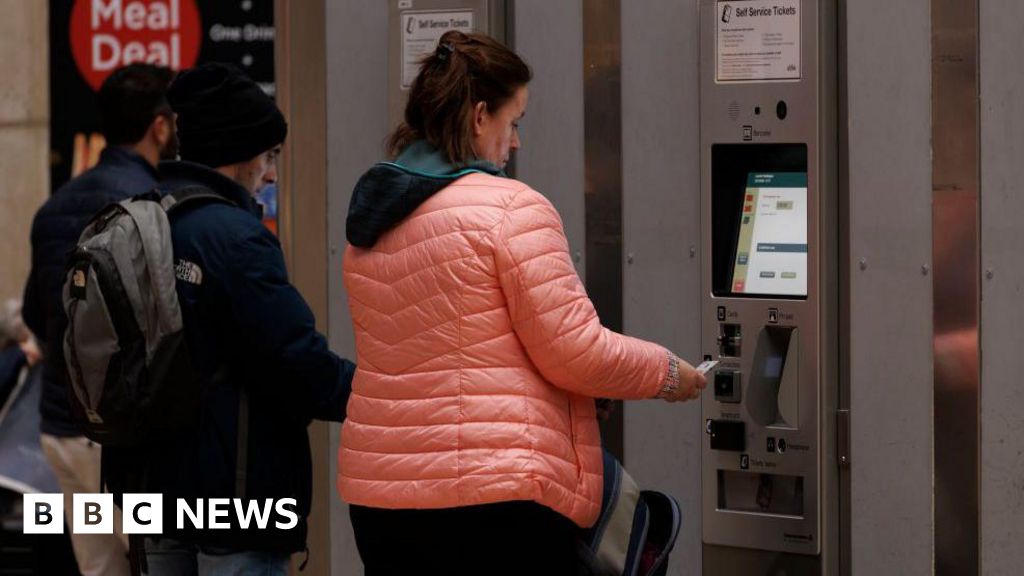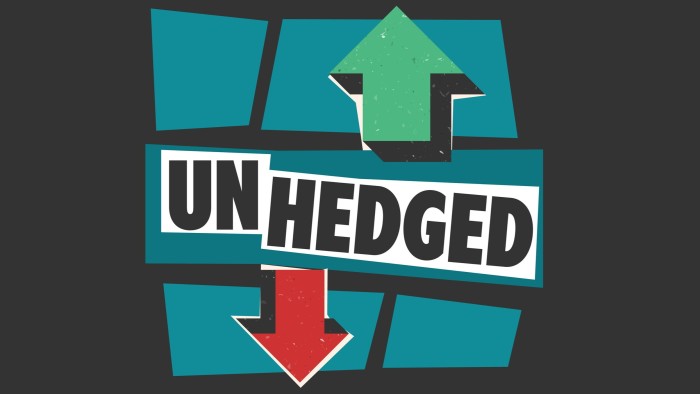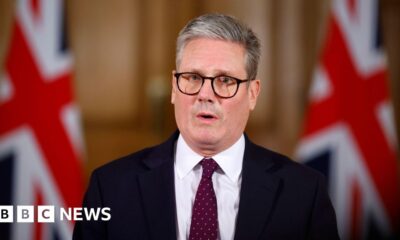This is an audio transcript of the Unhedged podcast episode: ‘Live from Kilkenomics: financial mistakes’
[MUSIC PLAYING]
Katie Martin
Hello and welcome to the first ever live recording of the Unhedged podcast with a live audience. Live audience, please cheer.
[AUDIENCE CHEERING]
I’m Katie Martin, a markets columnist at the Financial Times in London and I have ventured out of my cosy but slightly grey studio in the basement of FT Towers into a pub. Well, a room around the back of a pub in Kilkenny, part of the Kilkenomics Festival. It’s really great to be here. And in the run-up to the Kilkenomics festival, we thought to ourselves, would it be a good idea to record the podcast with a live audience? And the answer is, we don’t know. (Laughter) We’re gonna try it. It’s a big experiment, and experiments are the theme of this recording that we’ve got going on now.
So please welcome my special guests, Russell Napier, who is a former analyst from the Library of Mistakes, which is fittingly about economics, and Martín Lousteau, who’s a former economy minister from Argentina and now a senator for Buenos Aires. I’m gonna sit down now.
So we’re gonna do a bit of a kind of global tour of economic experiments and train wrecks and stuff that’s gone right, stuff that’s gone wrong, and whether we ever learn anything from the stuff that does go wrong. Hello, latecomers. Hi.
So, Martin, you are living through your very own live radical economic experiment in Argentina right now. You have a president who, tell me if I get this wrong. He takes . . . He’s like a radical libertarian, runs around with lots of chainsaws, takes his policy advice from his dogs, some of which are not alive? Is that all? Have I got this right?
Martín Lousteau
Yeah, partly so, yes.
Katie Martin
OK.
Martín Lousteau
He speaks to his dead dog. He’s an Austrian school economist, and he’s quite savage. Yeah.
Katie Martin
Yeah, he’s pretty savage. So . . . so when he speaks to journalists and when he kind of gives his big pronouncements, he talks about how he is leading a regime of freedom and he’s gonna put the country on the right track. What is he actually doing?
Martín Lousteau
OK. First, the good thing is that he’s not doing what he told us he was gonna do during the campaign. So he said he was gonna close down the central bank and dollarize Argentinian economy. So he didn’t do that. He said that he was gonna fine-tune or slash expenditure in a sensitive way, and he didn’t do that. He just used inflation to slash expenditure. He’s trying to recover Argentina’s reputation.
The issue with Argentina is not that he has 100 per cent inflation a year or high debt to GDP and high base, high interest rate, it’s that our reputation is zero. So whatever you want to do with any tools, we all envision that that’s gonna end up in disaster. So anticipate things. But it’s not so easy to rebuild reputation. So it’s what he’s been doing at the moment. First, he had a huge devaluation and 118 per cent devaluation that step up inflation from around 10 per cent per month to 25 per cent in December.
Katie Martin
That’s 10 per cent a month. Like this is quite hard for people outside of Argentina to get their head around.
Martín Lousteau
Yes. So it’s like 25 per cent a month. It’s like slashing your $100 bill in fifths and take one-fifth out of your purchasing power in a month. So he did that. We had 25 per cent inflation in December, 20 per cent in January, 13 per cent in February. So he used inflation in order to slash expenditure, pensions, public salaries, and it also happened with your own salary in the private sector. At the same time, he fixed exchange rate.
So we have what it’s called a crawling peg, which is an experiment that Argentina did in the 80s and ended up very badly. And he also managed the interest rate. So even your savings went down in real purchasing power. So either whether you had dollars before or a savings account, that went down in terms of purchasing power.
So what that did is it put the fiscal economy or the fiscal figures in the right track, but the real economy in a real hard recession. And that’s what we’re experiencing at the moment. So now the inflation rate came down to around 3 per cent per month, but the economy sank almost 4 per cent a year against year.
Katie Martin
So the IMF is praising his resolute action, right?
Martín Lousteau
The markets do as well.
Katie Martin
And markets do as well. And so that’s what I want to ask you about, Russell, is like, what is an economic mistake? And is it a mistake on our part to measure these things through market reactions? Maybe we should just say screw markets. This stuff doesn’t matter. Policy and markets have got to be separate beasts. What do you think?
Russell Napier
Have you told Kwasi Kwarteng that? Markets discipline governments until governments abolish markets. So I think it is a reasonable point. I think across the world, not just in Argentina. Governments can’t live with the consequences of markets. And the crucial one is their yield on government bonds.
So what we see and I think what we’ll continue to see is the governments picking up your point exactly and saying, well, wait a minute, we have an perfect answer to this. Because we have all these savings in the economy. And if we’re paying too much for government debt, if that’s the market disciplining us, we can easily discipline this market. Because we can force the people of our country to buy government bonds at a yield that we want to borrow. Now that’s called financial repression, but it goes to the crux of the question. If society concludes that it doesn’t want to be disciplined by markets, that we want to ignore markets, then effectively abolish them through compulsion.
And I’m sure you’re aware of the word in the UK now is mandation. We’re gonna hear a lot more about that at the Mansion House speech. So, yeah, I think we’ve got to that turning point in society where the politicians and the people potentially can’t cope with the consequences of market prices. So we effectively abolish them. This is a long, long cyclical structural swing and I think the rest of us, I can’t speak for Argentina, but the rest . . . it may be going a different way in Argentina, but in the developed world, that’s the world we’re gonna move into.
Katie Martin
Yeah. So you mentioned the mandation. This is a kind of debate in the UK around the idea that UK stock markets are kind of pretty rubbish, have been for a really long time. And what we should do is in some way force the UK pension system to buy UK equities. Now, this will be a kind of carrot-and-stick thing. You can’t, like, put a gun to people’s heads and say you must go and buy these stocks.
Russell Napier
But you can put a gun to people’s heads.
Katie Martin
In what way? (Laughter)
Russell Napier
Well, if you’re the government, of course you can do that. I mean, we could just simply pass a law tomorrow morning. And I think Argentina has done this in the past.
Martín Lousteau
Yes. We still . . . we still live in financial repression in Argentina. (inaudible).
Russell Napier
You could pass a law that says if you receive a pen . . . if you receive a tax break from the pension, 50 per cent has to be in UK assets. And if it isn’t, use your tax break. That’s not quite a gun to the head. You could actually just, and what we did after during world war 2, usually it’s during warfare that you put a gun to people’s head and you say you are buying government bonds. So, yeah, you can put a gun to the people’s head. You’re the government. You can do whatever the hell you like.
Martín Lousteau
Yes, in Argentina, you use that to finance the treasury. So, for example, if you buy certain type of bonds, that counts. It’s got a special accounting for a minimum capital requirement in banks. So you provide an incentive for capital to go to finance the treasury, yes.
Katie Martin
So this brings me on to kind of probably the biggest experiment of all, which is, you know, around government borrowing like writ large, right? There’s a load of stuff that governments need to spend money on, like defence, particularly in the UK and Europe, particularly after the election of Donald Trump, the green transition, because the climate is not gonna fix itself. Where . . . at what point does the market say, OK, enough? Russell?
Because this is one of these debates that every time bond yields are picking up for whatever reason, right? So prices are sinking, the yields are picking up, bond markets aren’t very happy. And people say, well, now’s the time. This is the market’s way of saying that, you know, so far and no further. How close are we to that?
Russell Napier
Well, as you’ve sort of alluded to, for 40 years, debt to GDP has been going up. And for 40 years, yields and government bonds have been coming down. So everybody, anybody who ever stood up and said enough is enough has been completely, totally and utterly wrong. So I’m here to tell you that enough is enough.
[AUDIENCE LAUGHTER]
So what we’re witnessing really across the developed world is no growth and broad money. And this is an argument for a certain type of economist, I suppose. And we’re watching bond yields going up. And of course, the market narrative is those bond yields are going up to reflect a coming inflation. But it’s highly unlikely that we’ve got a coming inflation when there’s virtually no growth in the money supply across the entire developed world. So it may be that we’ve already lived through the first four months of this where we’re beginning to realise that the market is beginning to price in a little thing for the unsustainability of this.
Now, to be clear, the unsustainability is not the government defaulting on interest in principle. The unsustainability is generating a level of inflation that gives you a very poor real return on fixed interest securities. So I’m gonna say to you that the market’s already beginning to price it in. And that means I can be wrong by Christmas.
Katie Martin
(Laughter) Yeah, because these things have a habit of going wrong, you know, slowly and then quickly, right? So what’s Argentina’s little dance been with global markets in terms of keeping the money coming in?
Martín Lousteau
Well, first, Argentina has something that’s called original sin. So it’s not the same as developed countries. So it’s very hard for you to get a loan in your own currency. So then it means that in order to repay the loan, you need to have a proper exchange rate in order to build reserves, build up reserves or attract capital. Otherwise you’re not able to finance yourself whenever you need to repay the loans. And that’s been happening in Argentina for quite some time. So when you were asking whether markets would say enough is enough for Argentina, they said many times enough is enough so we end up having no credit at all. So for example, now country risk for Argentina is around 900 basis points. So we pay 9 per cent of what Treasury bills pay.
Russell Napier
Can I ask you what, the people of Argentina hold a large percentage of their savings in somebody else’s currency. Have you had any idea what percentage of the, I mean, this is a double problem, even your own people. So how much of the savings of Argentina do you think rest in effect of the US dollars?
Martín Lousteau
The national accounts say that we hold around $280bn, so it’s roughly half of what we owe or a little bit of up of what we owe. And it’s a country in the world . . . After Russia. I think that has the largest amount of dollar bills per person.
Katie Martin
It’s amazing.
Martín Lousteau
Because whenever you have a country, for example, in my lifetime, I started studying economics in 1989. I lived through two hyper inflations, one big depression, devaluations and recessions almost half of my life.
Katie Martin
How does the . . .
Martín Lousteau
The tequila effect, the great financial crisis. So every four or five years we lived through the crisis. And the only way to get something, an instrument to avoid losing purchasing power is to hold someone else’s currency. That’s one of the reasons why even in the 90s Argentina adopted a currency board to stabilise and say, OK let’s go directly for a different currency. And in that moment, backing our currency with dollars, with hard dollars, and it ended up very badly.
Russell Napier
Can I suggest that this is the man who should be looking after your money?
Katie Martin
Yeah. (Laughter)
Russell Napier
I mean, he’s seen everything there is to see. We, I mean, the people of Ireland, we’re seeing more than most people, but we think we haven’t seen this. We think we’ll never see it. Well, we’ll see some of it but the professional people who manage our money, who are business school educated, been in the business for 20 years, have no comprehension of what a structural change is, where the government has to get more involved in the marketplace. So we’ve got all the wrong people running all your money at exactly the wrong time. So you should set up a fund management company. (Laughter)
Martín Lousteau
It’s impossible to survive in Argentina unless you understand something about economics. So a taxi driver knows that. So when we have inflation, nobody is leaving their money in their checking account. We know that for sure. We know that we’re losing time every single day that passes by.
Katie Martin
Argentina is an extreme case, right? But again, on top of the kind of extra kind of government borrowing that we’re likely to demand, like around the world, we do have a more inflationary world, right? We have supply chains that got horribly disrupted during Covid and made everyone think, OK let’s be less reliant on China. Let’s bring manufacturing back home. On the margins, that just means that, you know, that big disinflationary impulse that we had from China joining the WTO in 2005 has gone away.
So this sort of low level kind of simmering inflation is there in the global economy all the time. And as Russell, as you were suggesting, policymakers just haven’t grasped that yet because they just think, OK we need some money, let’s either print it or borrow it. It’ll be fine. It’s been fine for like the past, you know, 20 years or something. So it will continue to be fine. But what if it’s not?
Russell Napier
Well, it’s interesting. But what mandation is really a different approach because, as you say, either you borrow more at the government level or you print more. But there’s a third way and mandation is the third way. You take people’s savings and use them for what you want to do. Your government debt to GDP doesn’t go up. This is a contingent liability. You’re forcing people into these government bonds. You’re forcing them into what you want funded. And the reason that Argentina does unfortunately slip into hyperinflation is because people keep their savings outside of the country. You can’t mobilise the savings of the people of Argentina. It’s difficult to get confidence to do that.
But all our savings rests really in our kind of domestic currency. And if you want to utilise that through mandation, then you don’t need to borrow any more money at the government level. You don’t need to unnecessarily print lots of money. So in the ways you deal with excessive debt long before you get to hyperinflation, they’re stealing people’s savings.
So theft comes in all shapes and forms, but I don’t hesitate to call it stealing people’s savings, but it’s giving them a positive nominal return and a negative real return. We did it after world war 2 and there are lots of UK policymakers who think this is a brilliant template for what we should do. Now, if you held British government bonds from 1945 to 82, I think you lost 80 per cent of your purchasing power. And yet by many people, it’s seen as a tremendous triumph. And so that’s what we’re back in again. And that’s the way we’re gonna do that. And it . . . government debt to GDP comes down, it doesn’t go up over the long term.
Katie Martin
You presumably get the counterargument, though, right? Which is like the UK in particular is massively underinvested in domestic equities relative to its peers. We’ve got to do something to turn this around. Buying begets buying. You know, this is just a kind of first . . .
Russell Napier
This is turning it all around. I mean, first of all, it’s turning around because you’re mandating people to buy the equities. So you’re turning it like quite bluntly. But you’ve pointed out we’re having this dissociation from China, so you don’t get this massive investment boom funded by the mandation as you have new securities from mandation. So you get a really elevated growth rate for the United Kingdom, not just the United Kingdom, for kind of everybody as we retool ex-China.
So, you know, as you can tell, I’m really quite optimistic about all of this. But not for people who save. This is the problem. So when we did it after world war 2, the prime minister could say in 57, you’ve never had it so good. Well, if you’re a bondholder, you lost 30 per cent of your purchasing power. But if you’re the average guy in the street who was getting involved in all these new businesses and industrial production, so there’s a kind of industrial renaissance coming for the developed world. Could be Ireland, could be the UK, could be anywhere else except France.
Katie Martin
(Laughter) And possibly Germany.
Russell Napier
So let’s not be, you know, there are reasons to be pessimistic about this, you know, stealing money from savers. But there’s another side to it. More investment, more economic growth, more blue-collar jobs.
Katie Martin
Markets at least temporarily would like it so it won’t look like a mistake early on.
Russell Napier
Yeah, I call it stealing money from old people slowly. And if you do it slowly enough, they don’t really notice. It’s already happened. I mean, if you’ve held a British government bond since 2021, you’ve lost a fortune, in nominal terms and real terms. So we’re already stealing money from people.
Katie Martin
This is really cheerful. Let’s talk about something else really cheerful. Donald Trump, huge experiment coming down the tracks here economically from him. What on earth like, Martin, I’ll start with you. What do you make of the kind of tariff policies that he says he’s gonna bring in? Whether he does or not, we don’t know.
Martín Lousteau
OK. When I was the ambassador of Argentina to the US when Trump won the first time and there was, you never know whether he has intuitions or a team behind him that it’s like feeding him stuff.
Katie Martin
He’s not talking to dead dogs. That’s your guy . . . (overlapping talk)
Martín Lousteau
Yeah, that’s right.
Katie Martin
I bet he likes dogs.
Martín Lousteau
But at the beginning, the first term, he was saying, or his people were saying, OK, we cannot rely on Europe anymore because we cannot rely on American companies anymore because they are not American anymore. And we cannot rely on the WTO and multilateralism. And I think that part of those intuitions were OK for what he wanted to do.
So . . . And now he’s facing a world in which there are certain threats and certain trends and the friendshoring and the short-shoring. And I think that he’s building on what he did before on, giving it more, even more fuel. So this is the tariff thing; reshoring and bringing some production back to the US. But as Russell was saying, that would only add to inflation. And if you also are gonna send workers abroad and . . . because that will add to inflation as well. And so if we are seeing a world in which inflation is starting to be the tool to solve the issue of overindebtedness, then that will only add to the toolkit.
Katie Martin
Yeah. If there’s one thing he loves, it’s when stocks go up under his watch, right? And stocks like US stocks have had a really good run after he actually got elected. So he will see this as an immediate kind of, we know, welcoming from global investors. But at the same time, the bond market did puke quite a bit. And that’s the market’s way of saying, I’m not sure about this fiscal policy. I’m not sure about this deportation policy. So, you know, again, how seriously do you think we should take that warning sign, Russell?
Russell Napier
I think we should take it very seriously. What you’ve described and what I call this is national capitalism. This is using the savings of America for jobs for America, that the capital is not free to go wherever it wants. It’s national capitalism. Now, Trump’s got a problem with that. Foreigners own $57tn worth of his own assets. That’s the gross number. If you take the net, you know, net of what America owns overseas, it’s still $22tn on a negative basis. Now, if . . . Let’s take the UK. The UK begins with mandation. What are people gonna sell to buy all this stuff that the British government wants them to sell? What if this is the S&P 500?
President Macron is very keen on the same thing. He’s given a tremendous speech at the Sorbonne. He said, Europeans put $300bn a year into America; this is absurd. Like if Europe begins to repatriate capital, he’s actually short. I mean, he thinks he’s got the strongest economy in the world. He has, but it’s incredibly reliant upon sourcing foreign savings into the S&P 500, the Treasury market.
So what we’re maybe beginning to see, he thinks he wins that particular war. He’s a flow guy. He’s not really looking at stocks. He doesn’t win that war because if Japan, in particular, if Japan was to begin to repatriate capital to fund its own government, they’d be selling hundreds of billions of US securities every year. So that’s what . . . I think that’s the flaw that’s beginning to be priced into his bond market in particular.
Katie Martin
That’s been the kind of dog that hasn’t barked for so long, isn’t it? Any day now China is gonna say enough and start selling down its treasuries. And so is Japan. We’ve talked about whether that point is getting nearer, but how does that relate to the economic situation, particularly in China, where the potted history of the past couple of years is that the property sector went down the tubes and the idea among investors was, well, as soon as they pump enough money back into property, this is all gonna sort itself out. We’re gonna be able to invest in Chinese stocks again. It’s been horrible. There have been some big pick-ups along the way, but it’s been pretty horrible.
Russell Napier
We’ve talked about inflating away debt, so just give you the debt numbers. So America’s debt-to-GDP ratio, which is public and private, is 255 per cent of GDP, grossly over India and the United Kingdom’s 234 per cent. They’re 290 per cent and it’s going straight up.
Katie Martin
What, China? Yeah.
Russell Napier
China. So now they have to inflate away their debts. If we go back 15 years ago, they were about 130. They’ve gone from 130, to — there’s been nothing like it in human history.
So neither, as you’ve already alluded to, what is the consequence for the world of China has to inflate away its debts? Well, it can’t be a stable currency. And the reason they’ve been buying so many Treasuries is that exchange rate intervention to secure the level of the currency. So the whole global monetary system blows apart, because at the cornerstone of it was that link between the renminbi and the dollar.
And it cannot continue as they have to inflate away their debts. So we have a huge structural change. And I don’t have time to go into all of the distortions that the old system caused. But if you think, why do we have so much gearing in the world? Why are asset prices so high? It’s because the Chinese link their currency to the dollar. And I have a sort of 90-minute lecture on that, so I’ll not go further. But that, you know, every 30 or 40 years, monetary systems collapse. This one is collapsing in front of our very eyes. And the front page of the FT will still be talking about next quarter’s GDP growth.
Katie Martin
Yeah.
Russell Napier
It’s shocking. I mean, that’s not a reflection of FT, because that’s what everyone’s doing. The same in the industry as well. We’re not talking about the thing that’s staring us in the face. There’s a new global monetary system coming. And it’s because the old one didn’t have a name. It’s almost like it didn’t exist.
Katie Martin
Right.
Russell Napier
But of course it exists.
Katie Martin
What are you calling the new one?
Russell Napier
So the new one, I’ll call national capitalism.
Katie Martin
OK.
Russell Napier
It’s not a good thing. Well, if you’re a saver, it’s not a good thing. But as I said, if you’re a blue-collar worker, maybe it’s not a bad thing.
Katie Martin
Yeah.
Russell Napier
Having your debts inflated away with new opportunities in the manufacturing sector, it’s . . . Mr Piketty might call it a redistribution of wealth.
Katie Martin
But so the latest salvo from China was to announce it’s gonna pump another $1.4tn of stimulus into the market. Is this just kind of pissing in the wind?
Russell Napier
No. (inaudible) this is not played to Ireland because it doesn’t have an independent central bank, but countries with an independent central bank that begin the road to reflation always succeed.
Martín Lousteau
Yes.
Russell Napier
Always. They may stumble. You know, maybe it’ll take a second or third or fourth. I can’t think when you have an independent central bank and an independent fiscal policy, I can’t think of anybody who’s ever failed. So it’s gonna . . . of course it’s gonna succeed. May mean another round two and a round three. But yeah, of course, it will succeed.
Katie Martin
Well, this has been much more miserable than I was expecting.
[AUDIENCE LAUGHTER]
This is a bad way to start the day. But what we’re gonna do now is move on to like a little kind of feature that we have on the podcast, which is called Long/Short.
[MUSIC PLAYING]
What we’re gonna do now is move on to like a little kind of feature that we have on the podcast, which is called Long/Short — that part of the show where you go long a thing you love or short a thing you hate. It can be anything. I told you to prepare something and I don’t think you’ve done it.
Martín Lousteau
No.
Katie Martin
You’re gonna have to come up with something off the top of your head.
Martín Lousteau
I’ll short anger in politics because it prevents us from thinking.
Katie Martin
It’s just politics, generally.
Martín Lousteau
Anger in politics.
Russell Napier
Yeah, I think you’re right on that one. Russell?
Russell Napier
France.
[AUDIENCE LAUGHTER]
I don’t know. Why is everybody laughing? If I’d said Argentina, nobody would laugh. No, seriously.
Katie Martin
I just feel like we should have carved out 10 minutes to talk about that.
Russell Napier
What’s so funny about France, so I think not just France; all French assets. But go out and take a bet that will be a sixth republic within five years. I think they’re on their fifth republic, aren’t they?
Katie Martin
Yes.
Martín Lousteau
Yeah.
Russell Napier
So, yeah, I think you’d get pretty good odds on that. So bet on a French sixth republic within the next five years.
Katie Martin
Stop being so miserable.
Russell Napier
Ladbrokes is out the front door, to the right.
Katie Martin
Yeah, just down the road.
Russell Napier
Whether Kilkenny Ladbrokes has ever had such a bet, I do not know.
Katie Martin
Yeah. I don’t know if they’re taking odds on that sort of thing. I’m gonna be long you guys in the audience. I had no idea if anyone was gonna turn up to this, and you did. And you’ve been good fun. So thank you so much.
[APPLAUSE]
[MUSIC PLAYING]
Unhedged is produced by Jake Harper and edited by Bryant Urstadt. Our executive producer is Jacob Goldstein. We had additional help from Topher Forhecz. Cheryl Brumley is the FT’s global head of audio. Special thanks to Laura Clarke, Alastair Mackey, Gretta Cohn and Natalie Sadler.
FT Premium subscribers can get the Unhedged newsletter for free. A 30-day free trial is available to everyone else. Just go to ft.com/unhedgedoffer. I’m Katie Martin. Thanks for listening.
[MUSIC PLAYING]











































































































































































You must be logged in to post a comment Login